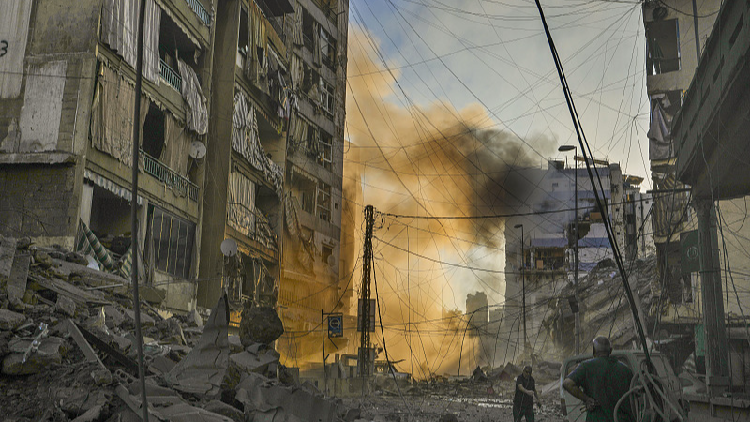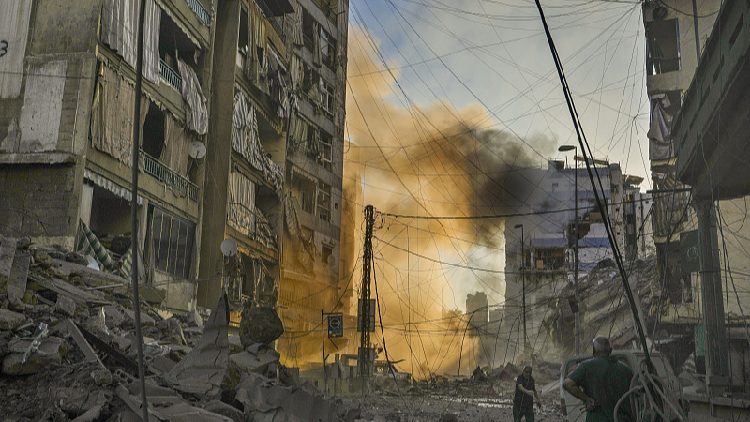Israeli strike closes off road used to flee Lebanon


<img src='https://news.cgtn.com/news/2024-10-04/Israeli-strike-closes-off-road-used-to-flee-Lebanon-1xqxcB3IG3K/img/75c101dab5c44a92b785a19cf2ef683f/75c101dab5c44a92b785a19cf2ef683f.png' alt='A man runs for cover as a smoke raises in the background following an Israeli airstrike in Dahiyeh, Beirut, Lebanon, October 4, 2024. /CFP'
An Israeli strike on Friday near Lebanon’s Masnaa border crossing with Syria cut off a road used by hundreds of thousands of people to flee Israeli bombardments in recent days, according to Lebanon Transport Minister Ali Hamieh.
Hamieh said the strike hit inside Lebanese territory near the border crossing, creating a four-meter-wide crater.
An Israel Defence Forces (IDF) military spokesman had accused Hezbollah on Thursday of using the crossing to transport military equipment into Lebanon.
“The IDF will not allow the smuggling of these weapons and will not hesitate to act if forced to do so, as it has done throughout this war,” IDF spokesman Avichay Adraee said on X.
According to Lebanese government statistics, more than 300,000 people—a vast majority of them Syrian—had crossed from Lebanon into Syria over the last 10 days to escape escalating Israeli bombardment.
The Israeli military on Friday told the residents of over 20 more southern towns in Lebanon to evacuate immediately, spokesperson Avichay Adraee said on X as Israel pressed ahead with its incursions in the region.
The escalating fighting between Hezbollah and Israel has raised fears that the United States and Iran will be sucked into the Middle East conflict raging on several fronts.
Nations worldwide have prepared contingency plans to evacuate citizens from Lebanon after a dramatic escalation in the conflict between Israel and the Lebanese armed movement Hezbollah.
Although no country has launched a large-scale military evacuation yet, some are chartering aircraft. People are also fleeing on their own.
China on Wednesday called on the United Nations Security Council to take urgent actions to de-escalate the Lebanese-Israeli situation.
“The Security Council bears the primary responsibility for the maintenance of international peace and security,” Fu Cong, China’s permanent representative to the UN, said at the Security Council briefing on the Lebanese-Israeli situation.
Warning that the current situation is “hanging by a thread,” Fu said any passive procrastination would be irresponsible and any rhetoric of condoning further military adventurism would send the wrong message and cause serious consequences.
U.S. President Joe Biden said he did not believe there is going to be an “all-out war” in the Middle East as Israel weighs options for retaliation after Tehran’s largest ever assault on its arch-enemy.
However, Biden said more needed to be done to avoid a Middle East war, as Israel’s military hit Beirut with new air strikes in its battle against Lebanese armed group Hezbollah.
While the United States, the European Union, and other allies have called for an immediate 21-day ceasefire in the Israel-Lebanon conflict, Biden said the U.S. was discussing with Israel its options for responding to Tehran’s assault, which included Israel striking Iran’s oil facilities.
On Wednesday, the president said he would not support any Israeli strike on Iran’s nuclear sites.
Beirut’s southern suburb of Dahiye, a stronghold of the Iran-backed Hezbollah, came under renewed strikes near midnight on Thursday after Israel ordered people to leave their homes in some areas, residents and security sources said.
The air raids targeted Hezbollah official Hashem Safieddine, the rumored successor to its assassinated leader Hassan Nasrallah, in an underground bunker, Axios reporter Barak Ravid said on X, citing three Israeli officials.
Safieddine’s fate was not clear, he said.
Israel’s military declined comment.
Israeli Prime Minister Benjamin Netanyahu has vowed Iran will pay for Tuesday’s missile attack, and Washington said it would work with its longtime ally to ensure Iran faced “severe consequences.”
Iranian President Masoud Pezeshkian, speaking in Doha, said on Thursday that Tehran would be ready to respond.
“Any type of military attack, terrorist act or crossing our red lines will be met with a decisive response by our armed forces,” he said.
Israel, which has been fighting Hamas in the Palestinian territory of Gaza for almost a year, sent troops into southern Lebanon on Tuesday after two weeks of intense airstrikes in a worsening conflict that has drawn in Iran and risks involving the United States.
(With input from Reuters)

